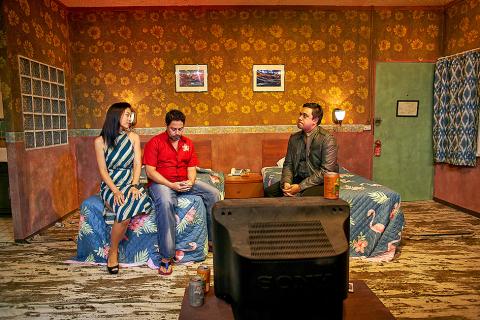With Stephen Belber’s TAPE, theater director Brook Hall has a hard-hitting final play for The LAB Space.
High school reunions are tricky. Some classmates have moved on in life, others have not. Some dredge up a past that others want to forget, especially when it involves sensitive matters like rape.
This one-act play opens and takes place in a very realistic, semi-grungy Motel 6 room in Lansing, Michigan, wonderfully put together by Ridge Production Studio.

Photo courtesy of Jamie Osho Mactography
TAPE is a demanding play for its actors, where all three characters must adapt to rapid-fire dialogue and changing emotions, but Hall chose a skilled team.
Lucas Salazar plays Vince, the volunteer fireman and drug dealer who allegedly has come to celebrate former high school friend Jon’s success in the film industry, but in reality seeks to expose why Amy, a girl that he and Jon dated, slept with Jon but not with him.
With great energy Salazar clearly delights in this manipulative and sinister role; he bounds about and plays on Jon’s sympathy while calculating his end game.
LAB veteran, John Brownlie, as Jon, has the challenging role of being the unsuspecting, blind-sided friend, trying to be helpful but slowly realizing Vince’s calculating subterfuge.
Enter Amy, Michelle Kao (高微嵐), who at first appears to be an unsuspecting pawn and spectator in Vince’s game of watching Jon squirm between guilt and apology.
Vince thinks he is in control and hopes to impress Amy until he realizes the strong, resilient Amy has moved on in her own way.
TAPE is a play with a high stakes end for all, where each character is pushed to the limit. The end comes quick — an end that will certainly linger in the viewer’s mind after the curtain falls.
Due to subject matter, no children under 16 are admitted without an adult guardian.

In the March 9 edition of the Taipei Times a piece by Ninon Godefroy ran with the headine “The quiet, gentle rhythm of Taiwan.” It started with the line “Taiwan is a small, humble place. There is no Eiffel Tower, no pyramids — no singular attraction that draws the world’s attention.” I laughed out loud at that. This was out of no disrespect for the author or the piece, which made some interesting analogies and good points about how both Din Tai Fung’s and Taiwan Semiconductor Manufacturing Co’s (TSMC, 台積電) meticulous attention to detail and quality are not quite up to

April 21 to April 27 Hsieh Er’s (謝娥) political fortunes were rising fast after she got out of jail and joined the Chinese Nationalist Party (KMT) in December 1945. Not only did she hold key positions in various committees, she was elected the only woman on the Taipei City Council and headed to Nanjing in 1946 as the sole Taiwanese female representative to the National Constituent Assembly. With the support of first lady Soong May-ling (宋美齡), she started the Taipei Women’s Association and Taiwan Provincial Women’s Association, where she

Chinese Nationalist Party (KMT) Chairman Eric Chu (朱立倫) hatched a bold plan to charge forward and seize the initiative when he held a protest in front of the Taipei City Prosecutors’ Office. Though risky, because illegal, its success would help tackle at least six problems facing both himself and the KMT. What he did not see coming was Taipei Mayor Chiang Wan-an (將萬安) tripping him up out of the gate. In spite of Chu being the most consequential and successful KMT chairman since the early 2010s — arguably saving the party from financial ruin and restoring its electoral viability —

It is one of the more remarkable facts of Taiwan history that it was never occupied or claimed by any of the numerous kingdoms of southern China — Han or otherwise — that lay just across the water from it. None of their brilliant ministers ever discovered that Taiwan was a “core interest” of the state whose annexation was “inevitable.” As Paul Kua notes in an excellent monograph laying out how the Portuguese gave Taiwan the name “Formosa,” the first Europeans to express an interest in occupying Taiwan were the Spanish. Tonio Andrade in his seminal work, How Taiwan Became Chinese,